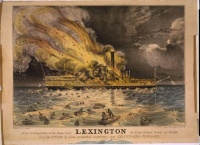Journalism
From The Art and Popular Culture Encyclopedia

|
"If you don't like the news ... go out and make some of your own" --Wes Nisker "Freedom of the press is guaranteed only to those who own one" --A. J. Liebling |
|
Related e |
|
Featured: |
Journalism is a discipline of gathering, writing and reporting news, and more broadly it includes the process of editing and presenting the news articles. Journalism applies to various media, including newspapers, magazines, radio, and television.
History
Johann Carolus' Relation aller Fürnemmen und gedenckwürdigen Historien, published in 1605 in Strassburg, is often recognized as the first newspaper. The first successful English daily, The Daily Courant, was published from 1702 to 1735. From informal beginnings, stimulated by the arrival of mechanized printing—in due course by mass production and in the 20th century by electronic communications technology—today's journalistic enterprises include large corporations with global distribution that include newspapers, television and the Internet.
The formal status of journalism has varied historically and still varies greatly from country to country. The modern state and hierarchical power structures in general have tended to consider unrestricted flow of information as a potential threat, and inimical to their own proper function.
Censorship, governmental restriction or even active repression of individual journalists and non-state organs of communication continue to cause, at best, intermittent trouble in most countries. Few formal democracies and no authoritarian governments make provision for protection of press freedom implied by the term Fourth Estate.
The rise of Internet technologies, in particular the advent of blogging and social networking software, further destabilize journalism as defined traditionally, and its practitioners as a distinct professional category. Combined with the increasing transfer of advertising revenue from print and broadcast media to the internet, the full effect of the arrival of the "citizen journalist" — potentially positive (proliferation having thus far proved more difficult to police) as well as negative— is not yet known.
See also
- Churnalism
- Creative nonfiction
- History of journalism
- History of American newspapers
- Jazz journalism
- Journalism ethics and standards
- Journalism in Australia
- Journalism education
- Journalism school
- Objectivity (journalism)
- Pen & Pencil Club
- Reporters without borders
- Yellow journalism
- Bus plunge (nickname for a type of short news story)
- Online newspaper
- Online magazine

